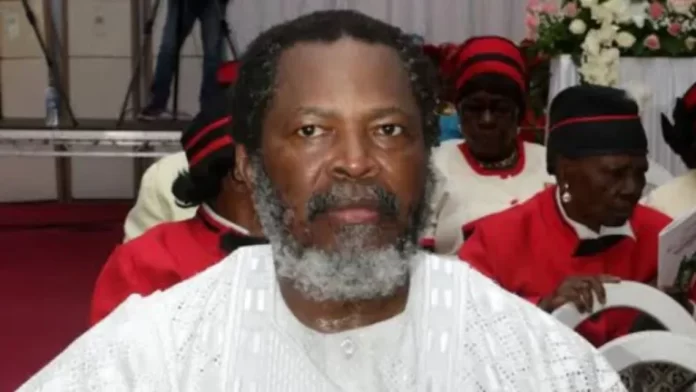We don’t owe FirstBank $225m — Obaigbena’s GHL
By Jeffrey Agbo
General Hydrocarbons Limited (GHL) has refuted claims that it owes First Bank of Nigeria Limited (FBN) $225 million.
The company owned by the chairman and founder of ThisDay and Arise Media Group, Nduka Obaigbena, has been locked in a dispute with the bank.
Explaining its side of the story, the company said in a statement signed by Abdelmuizz Bello, Director of Strategy and Operations, and made available to TheNiche on Monday: “We entered a legally binding, enforceable Subrogation Agreement with First Bank on May 29, 2021, with FBN agreeing to fund GHL’s exploration, production and development of OML 120 in exchange for sharing profit from oil proceeds from the OML in a 50:50 ratio after statutory payments and taxes over 8 years. The FBN 50% share will then be used to pay down its non-performing loans of about $718million which was discounted to $600m to resolve its solvency issues therefrom.
“In its quest to stay afloat, the FBN loan was sold at $600million as an Eligible Banking Asset (EBA), with comfort from GHL; the FBN then collected the cash from Assets Management Company of Nigeria (AMCON) with which they rebuilt the bank without meeting GHL’s needs.
“The FBN non-performing loan arose from FBN’s unsecured and reckless lending to Atlantic Energy under separate Strategic Alliance arrangements, in which GHL had no nexus to or connection with. The agreements made it clear that the Non-Performing Loan had nothing to do with GHL beyond the fact that 50% of profits from OML 120 due to FBN under the Subrogation Agreement will be used by FBN to settle the hole created in its books by the Non-Performing Loan (NPL). For clarity, Atlantic Energy operated OMLs 26, 30, 34 and 42 – very different from GHL’s OML 120.”
The agreements it signed, GHL said, enabled the FBN to return to good standing as follows: “Instead of declaring a loan loss of N302Bn at the then exchange rate, the signing of the Tripartite agreement with GHL enabled FBN to declare a profit of N151Bn ($377.5million) for the year ending December 31, 2021. GHL signed the agreement trusting and believing that the FBN which it thought was a bank with integrity, would comply and continue to comply with its obligation to fund OML 120;
“FBN’s failure and refusal to do so has opened a challenge to its audited financial statement. Given its non-compliance with conditions precedent for its return to profitability, could those profits remain valid? And were investors in its current rights issues duly informed?
“FBN’s market capitalization before the agreement was N256.6Bn. Had it declared a loss of N302Bn, the bank would have had a negative capital of N46Bn. FBN then immediately realised profitability from the GHL’s subrogation agreement. GHL signed the agreement believing and trusting that the FBN as a bank with integrity would comply and continue to comply with its obligations to fund OML 120; but it has clearly not done so.
READ ALSO:
Why Senator Jarigbe ran away midway from Arise TV interview – Shehu Sani
“Following the agreements with GHL, FBN’s market capitalization of N256.6Bn, more than tripled to over N900Bn as of 30th November 2024.
“Essentially, GHL’s grouse is FBN’s failure to meet its agreed and executed financial commitments which GHL had believed would be made, when it signed the agreement resulting in critical challenges for the development of OML 120.
“Although FBN had disbursed $185million, the way and manner of the disbursement which was agreed to be 5 days after funding request, sometimes lasted up to 70 days after funding request; service providers led by Schlumberger, Baker Hughes and Century that were supposed to be paid at the same time for various interventions were paid sporadically at different times, resulting in massive losses in day rates and downtimes, leading to inefficiencies and losses of over $147million, including an arbitration award to one of the service providers.”
The statement said the bank’s credit and risk team verified and approved all contracts and invoices due to the contractors engaged for the development and operations of the oil mining lease and made payments directly to these contractors and service providers.
It added that the allegations of diversion of the funds advanced to GHL were befuddling and without merit as payment were made by FBN directly to service providers after vetting and approval by its credit and risk teams.
It further said FBN later appointed a CFO for GHL, taking full responsibility for all financial disbursements.
The statement continued: “It is important to also mention that the oil block is over 75 kilometres offshore Nigeria, with a Floating Production Storage and Offloading (“FPSO”) that requires transportation and logistics support with over 250 personnel on the FPSO and the associated submersible rig. This has involved heavy logistics planning with over 500 helicopter sorties, engagement of platform supply vessels, security vessels, mooring vessels, etc., which were provided daily over the course of the last 40 months. All these expenditures, including food, were vetted, approved and paid directly by FBN’s credit and risk teams.
“In view of the approval process for the funds put in place by FBN, and the payment made directly to contractors and service providers, the allegation of diversion contained in some publications is therefore wicked, malicious, false, injurious and libellous.
“It is important to note that the disbursed loan of $185million is not due for repayment. The loan is still within the moratorium period as per the Facility and Tripartite Agreements. The loan is only due when there are profits to be shared 50:50 from commercial oil production. Clearly, there is need for much more money which FBN has refused to provide. Instead of performing its role as a lender who was saved from the abyss, FBN is trying to bully and force GHL out of the transaction and take over the oil bloc, using its directors and other proxies with this clearly induced crisis.
“It is also instructive to note that First Bank has made no demand for repayment of the facilities until after the fact a few days after they lost in court, as they know that the loan is not due for repayment.
“Clearly, FBN is either illiquid, unable or unwilling to fund the project as agreed after they had made profits upfront.
“GHL is seeking to exercise its options under the agreement to find new lenders and partners that can be efficient and cost effective to save the project for Nigeria , should FBN remain intransigent. The Subrogation Agreement contains a clause that allows GHL to seek for alternative financing in the likelihood FBN is unable to provide such financing.
“Following FBN’s non-performance under the terms of the Subrogation Agreement, GHL was left with no option but to approach the Court to seek injunctive reliefs and protective orders to secure its commercial and economic interests and find resolution via arbitration.”
GHL said it approached the Federal High Court and obtained the following injunctions against First Bank on December 12, 2024:
“An Order restraining FBN from obstructing or preventing GHL from obtaining or securing loan facilities or funding necessary for the exploration or operation of OML 120.
“An Order restraining FBN from making any calls or demands, or taking any steps whatsoever to enforce any security, receivables, instrument, finance documents or assets of GHL which have been charged as Security.
“An Order restraining FBN from appointing an operator, asset manager or any person/institution of the same/similar ilk in respect of OML 120, pending the hearing and determination of the arbitration proceedings between GHL and FBN.”
It concluded that “despite the existence of a subsisting court order, FBN, using the same lawyers who lost at the Federal High Court presided by Justice Allagoa, went to another judge of coordinate status during recess without disclosing the earlier judgement, to obtain an interim Mareva injunction restraining GHL and its shareholders from operating their accounts over a purported and unfounded debt of $225.8million.
“The FBN had since weaponised the Mareva injunction which it procured on December 30, 2024, to confuse the public and befuddle the issues. A clear abuse of the Court Process.This impunity is now back before the Federal High Court, Lagos. We believe that sooner or later Justice will be served.”















